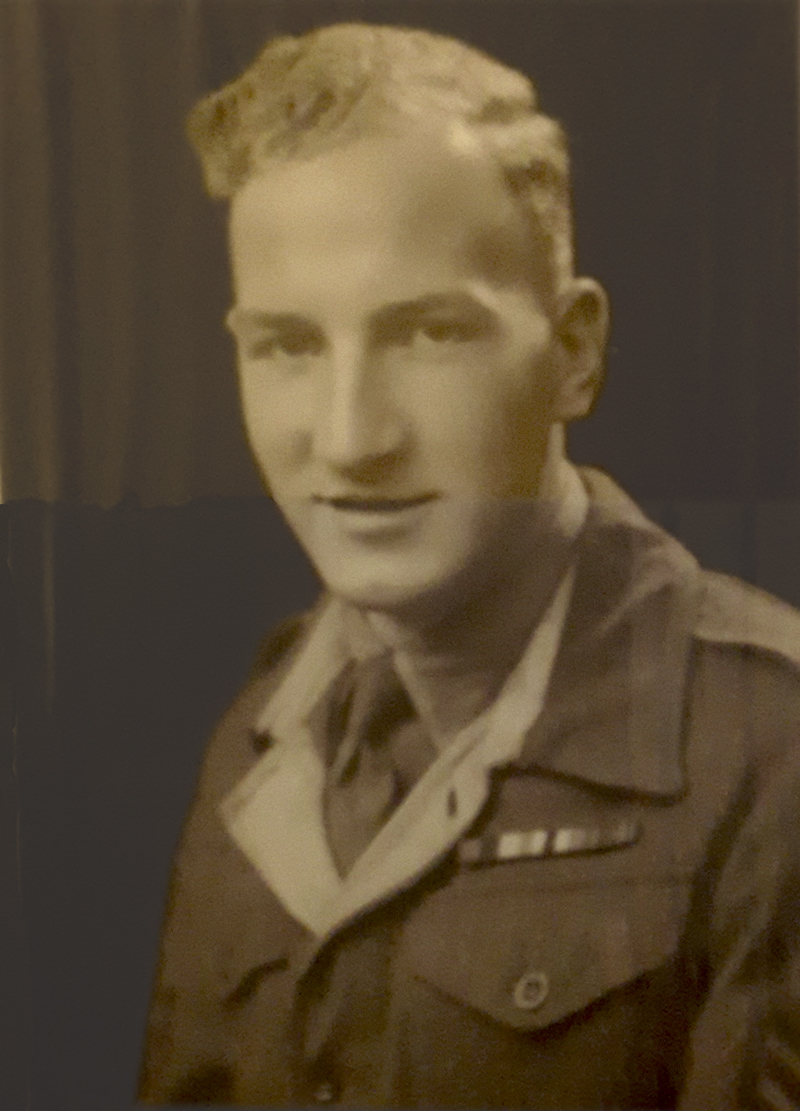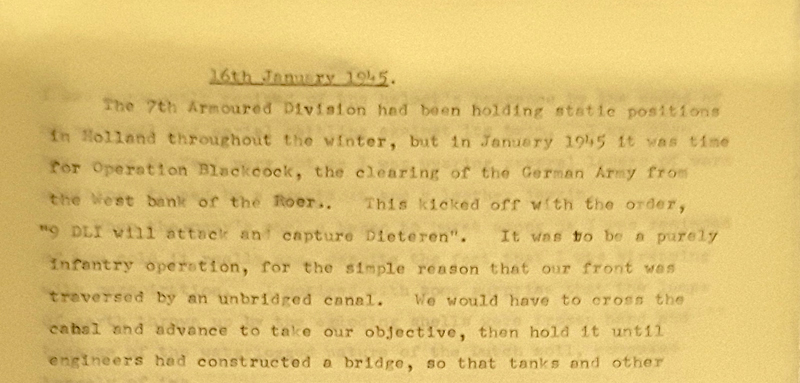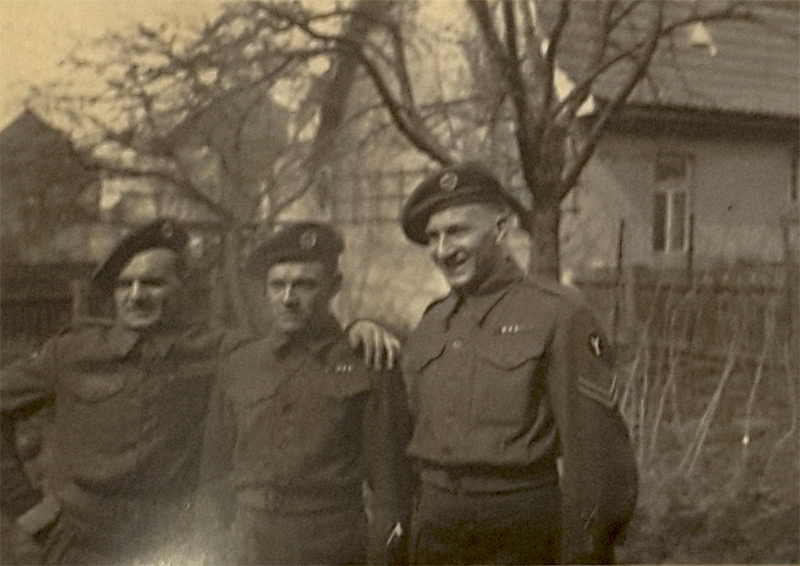In memory of those who fought for our freedom
Herinnering aan onze bevrijders
Private Ronald Mallabar:
Legeronderdeel:
Nummer:
Geboren:
Gewond:
Overleden:
| 9th Battalion Durham Light Infantry
14375580
25 juli 1924
Dieteren, 16-17 januari 1945
30 oktober 2013
|
Ronald Mallabar was opgeleid als “Signaller” en was vervolgens als Regimental Signaller verbonden aan: East Yorkshire Regiment,Durham Light Infantry en Essex Regiment.
Ronald Mallabar was al vanaf D-Day op verschillende plaatsen actief ingezet. Eind 1944 kwam hij naar onze streek en zo was hij in december 1944 ingekwartierd bij een familie in Sittard. Hij was toen al als signaller ingedeeld bij het 9th Bn. Durham Light Infantry.
Toen op 16 januari 1945 operatie Blackcock startte was hij er dan ook bij toen Dieteren werd bevrijd. Hij tekende jaren later zijn belevenissen van die dag op welke u hieronder kunt lezen. In Dieteren raakte hij zwaar gewond en werd eerst in een veldhospitaal verzorgd en daarop in Frankrijk in een ziekenhuis verpleegd waarna hij weer actief zijn dienst als signaller hernam bij zijn eenheid die toen oprukte Duitsland in tot in Berlijn.

Ronald Mallabar als jonge soldaat. Met dank aan:/Thanks to: Geoff Mallabar

Fragment van door Ronald Mallabar getypt verslag van belevenissen in Dieteren. Met dank aan:/Thanks to: Geoff Mallabar
Verslag door Ronald Mallabar
16th January 1945.
The 7th Armoured Division had been holding static postitions
in Holland throughout the winter, but in January 1945 it was time
for Operation Blackcock, the clearing of the German Army from
the West bank of the Roer. This kicked off with the order,
“9 DLI will attack and capture Dieteren”. It was to be a purely
infantry operation, for the simple reason that our front was
traversed by an unbridged canal. We would have to cross the
canal and advance to take our objective, then hold it until
engineers had constructed a bridge, so that tanks and other
vehicles could follow to support us. We were even ordered to
wear our helmets instead of the woolly hats we normally affected.
We moved off in the early morning. It was bitterly cold
and the ground was covered in thick snow. The fog was largely
of our own making, being caused by our smoke screen freezing in
the air and refusing to disperse. Because of this, although
the whole battalion was moving forward, I could only see the few
men nearest to me.
As a regimental signaller attached for time being to a rifle
company, I carried on my back a No.18 radio set weighing 56lbs.
This, of course, displaced my pack, wich was slung on my left
side beside my bayonet. My water bottle was on my right side
and my entrenching tool slung below my belt at the back. The
ammunition pouches on my chest and the bandolier of fifty cartridges
over my shoulder completed the hundredweight of equipment under
wich I trudged. Of course, I also carried my rifle and on my
head I wore the hated new model helmet. We all knew that these
helmets were unlucky. Besides, they looked awful, being in
appearance a cross between a Russian and a German helmet. I had
disposed of my old-faschioned one when I was wounded four months
previously and bitterly regretted it.
I was constantly reminded of the helmet's prezence by the sound of
my vertical rod serial rattling against its brim. I was else
beginning to feel very hot as I was wearing several layers of warm
clothing, topped by a greatcoat and a leather jerkin.
When the enemy's shells began to burst among us I was reminded
of how cold it really was, despite the fact that I was streeming
with perspiration. I noticed with some surprise that the lumps
of earth thrown up by the exploding shells were frozen hard and
because of the waterlogged nature of the Dutch soil, composed
largely of ice.
A signaller in the infantry laboured under a number of dis-
advantages. Foremost, he was a prime target for snipers, because
to eliminate him played havoc with the battalion communications.
He also had the serious problem, because of the chattering in his
headphones, of being unable to hear what was going on around him.
He had, perforce, to keep his eyes darting about in order not to
miss seeing what his comrades were doing. They, of course, could
hear various unpleasant noises wich caused then to trow them-
selves to the ground. Our signaller, on seeing this, would
follow suit, always a little late! When he hit the ground, he
encountered another disadvantage - half a hundred-weight of radio
in its brass case shot forward along his back, hit him on the back
of his head, knocked his helmet over his eyes and winded him.
This was why, on the occasion of this brief bombardement, I chose
to take my chances and remain on my feet.
We were soon in the village and, after a brisk fight, the
surviving Germans withdrew. I entered an empty house, dumped my
radio on the floor and sat beside it. A series of loud explosions
just outside caused my to throw myself flat against the wall.
I got up again, somewhat relieved, when I found that the racket was
caused by riflemen expoding anti-personal mines in the hope of
lacraning the hard-frozen earth sufficiently to unable them in
dug trenches.
A message came over the air from battalion headquarters,
ordering everyone to listen for enemy tracked vehicles which were
supposed to have put in an appearance. We were glad to do so -
if German tanks got in among us we would have a hard time.
Naturally we convinced ourselves that we could hear the familiar
roar, clank and squeak approaching, but no tanks materialised.
The next message I received was equally alarming. Enemy
machine-gunners had got behind us and put a stop to the bridge-
building by firing along the canal. My company was to send a platoon
back to deal with them. I accompanied the platoon as it trudged
back through the village. The lieutenant led the way, followed
by myself and behind me a dozen riflemen in single file, of whom,
because of the fog, I could only see the first two. Before we
had left the village, I saw the lieutenant throw himself to the
ground and draw his revolver. I too crashed into the snow,
with the usual unpleasant results. We lay like this for a while
then up got the officer, taking a few more steps, only to dive
down again. Once more I followed suit, unable to see much, but
beginning to feel rather sore and breathless. Up we got again,
only to repeat the process for a third time. Thoroughly fed up,
I crawled through the snow towards the officer. As I drew close
to him, I got the impression that he was sobbing, but when I lay along-
side him, I could see that he was shaking with laughter. Being
in no mood for hilarity, I snarled at him, "what the hell is
going on?" I honestly thought he had gone mad. He
could not reply for chortling, but took hold of his water-bottle
and shook it in my face. The contents had frozen and lumps of
ice clanked against the sides of the metal container. As he
explained when he recovered, it sounded exactly like a rifle
being cocked and each time he heard it he thought that he was
about to fall victim to a sniper, hence his diving exhibition.
I passed word back to a relieved platoon and we continued our
walk.
We reached the canal without incident and patrolled along it
for a few hundred yards. There was no sign of the enemy, so we
set off back towards the village. On the way we passed a German
sub-machine gun lying on the ground. Normally, this would have
been picked up by someone for his personal use, as they were in
great demand, but we left this example because it had its careless
former owner's bloody fingers mangled in the breech mechanism.
We then saw a dead German lying face down in the snow. The
top of his skull had been sliced off and lay in front of him like
the lid of a box, still hinged by the skin of his forehead.
I noticed, without emotion, that his brain looked just like a
walnut in its half-shell.
We had just reached the village when I heard the thumping
sound of a mortar battery opening fire and I knew somehow that
this time I was for it. I turned to face a farm building on my
left and dropped to my knees just as one of the bombs exploded
right behind me. I felt a crash at the back of my head and was
blown against the wall. My leather jerkin immediately turned red
and glossy with the blood that was pouring down my face and
running off my chin. Still on my knees, I imagined myself lying
face down in the snow with the top of my skull sliced off.
What had happened was that the blast had been taken by the
soles of my boots, my entrenching tool, my radio and my helmet.
My "unlucky" helmet was split from top to bottom, but it and my
radio had saved my life. A bomb splinter had passed between
the rim of my helmet and the top of the radio and hit me in the
back of the head. The blood was mainly from my left ear, where
the splinter had emerged.
I was patched up with field dressings and passed on to an
Advanced Dressing Station, where a doctor examined me and cheer-
fully said “Hello! You're the fellow with five holes from one bullet!”
This was news to me, so I asked what he meant. He explained
that the splinter had entered the back of my head and reappeared
just behind my ear, making two holes. It then hit the back of
my ear and came out at the front, making two more holes. It had
then clipped a piece off the little lug at the front of my ear
and this was claimed as the fifth hole. I was a celebrity!
Twenty years later, after suffering shoulder pain, a lady doctor
at my local hospital back in England removed a piece of steel
helmet from my head. She was German!
Ronald Mallabar
H.Q. Coy.
9th Bn. Durham Light Infantry
|
In Berlijn heeft hij nog een tijd na de capitulatie van Duitsland in het leger gediend. Toen hij daarna in Engeland terugkeerde ging hij werken bij de Newcastle Police. Hij is overleden 30 oktober 2013.

Ronald Mallabar (rechts) met enkele cameraden. Met dank aan:/Thanks to: Geoff Mallabar
Misschien zijn er nog mensen die informatie hebben over die tijd zoals verhalen of foto's. Neem dan contact op met de webmaster info@deetere.nl wellicht kan het bijdragen aan de geschiedschrijving van onze streek en mogelijk ook van belang voor familieleden van onze bevrijders!
| |


